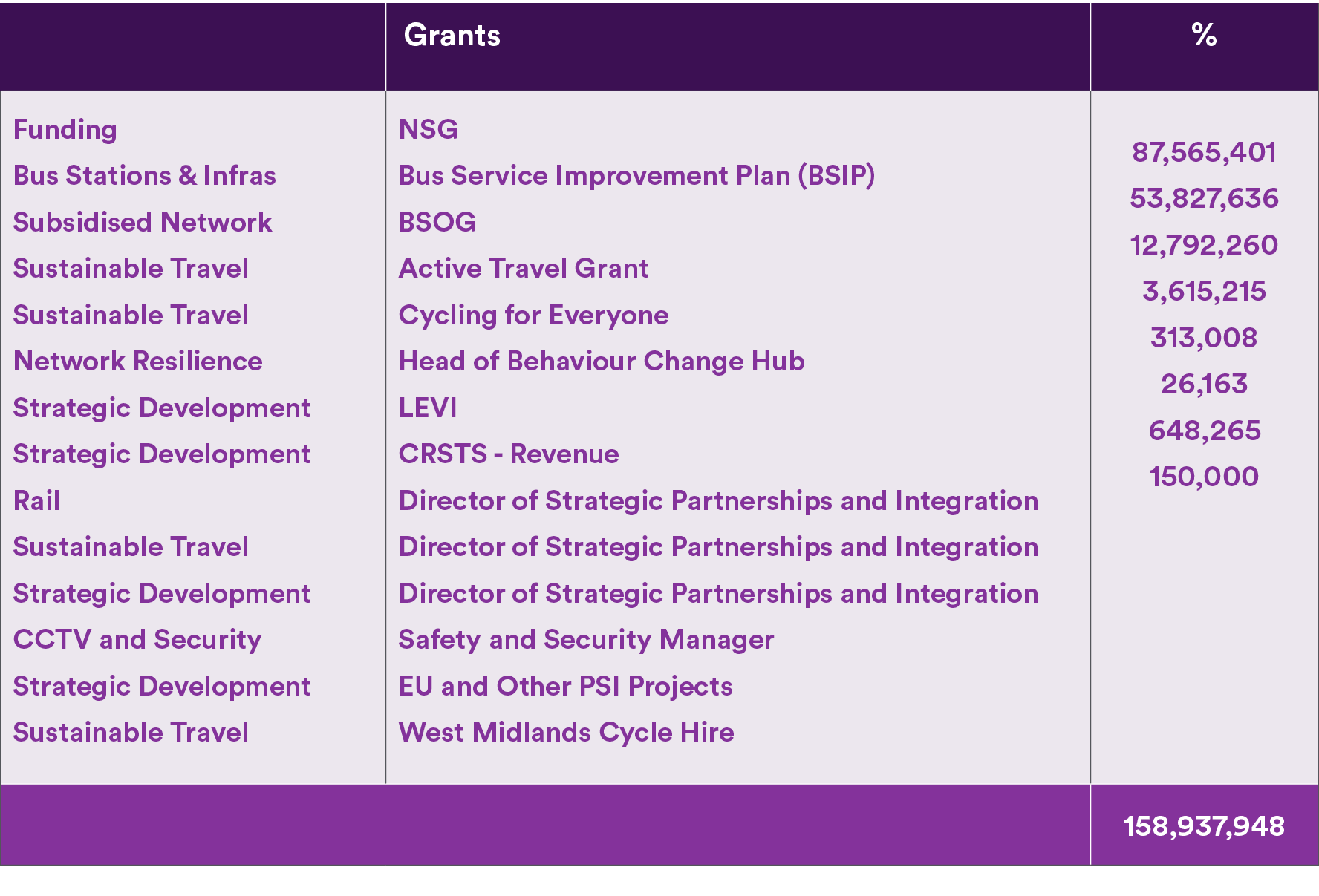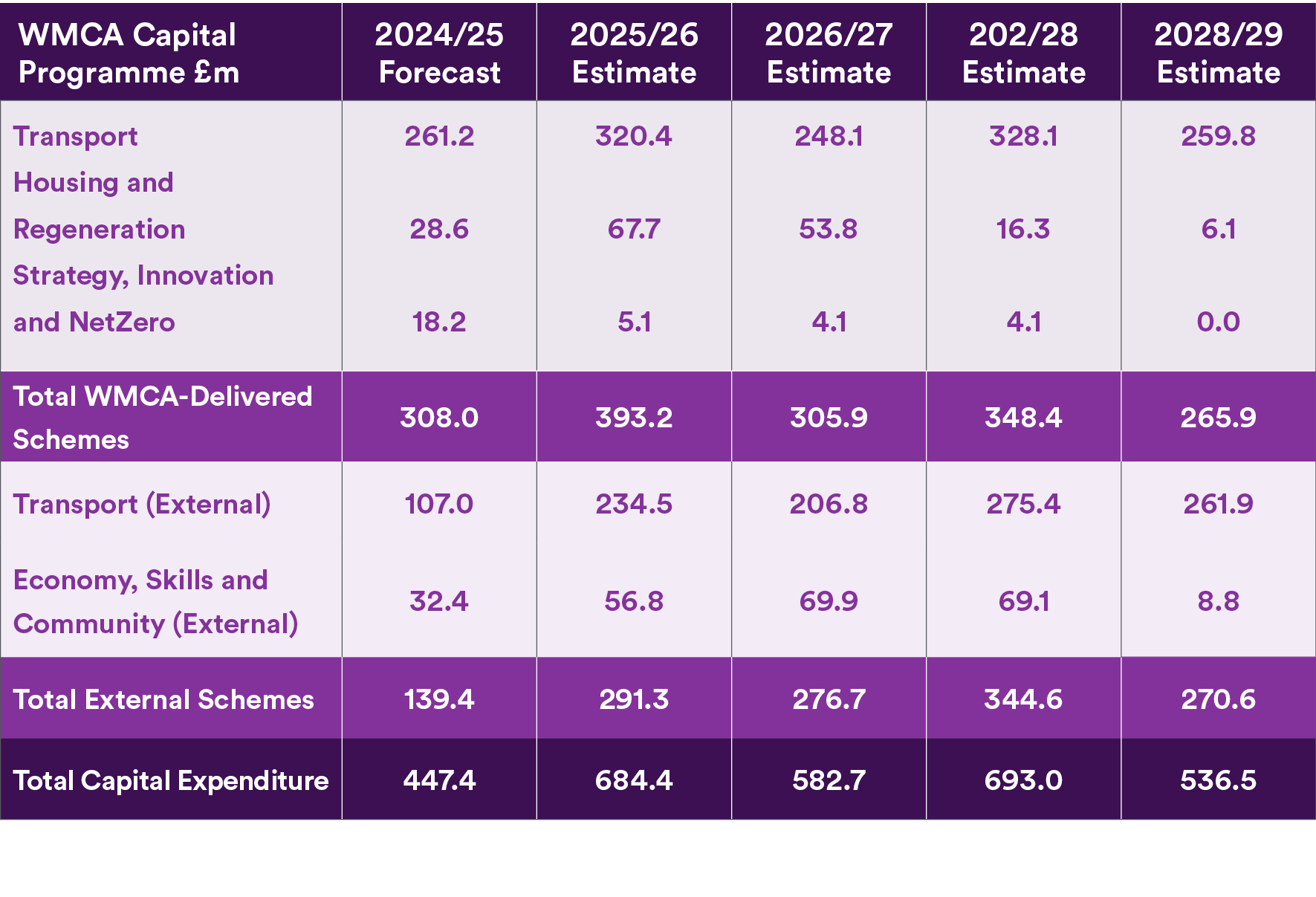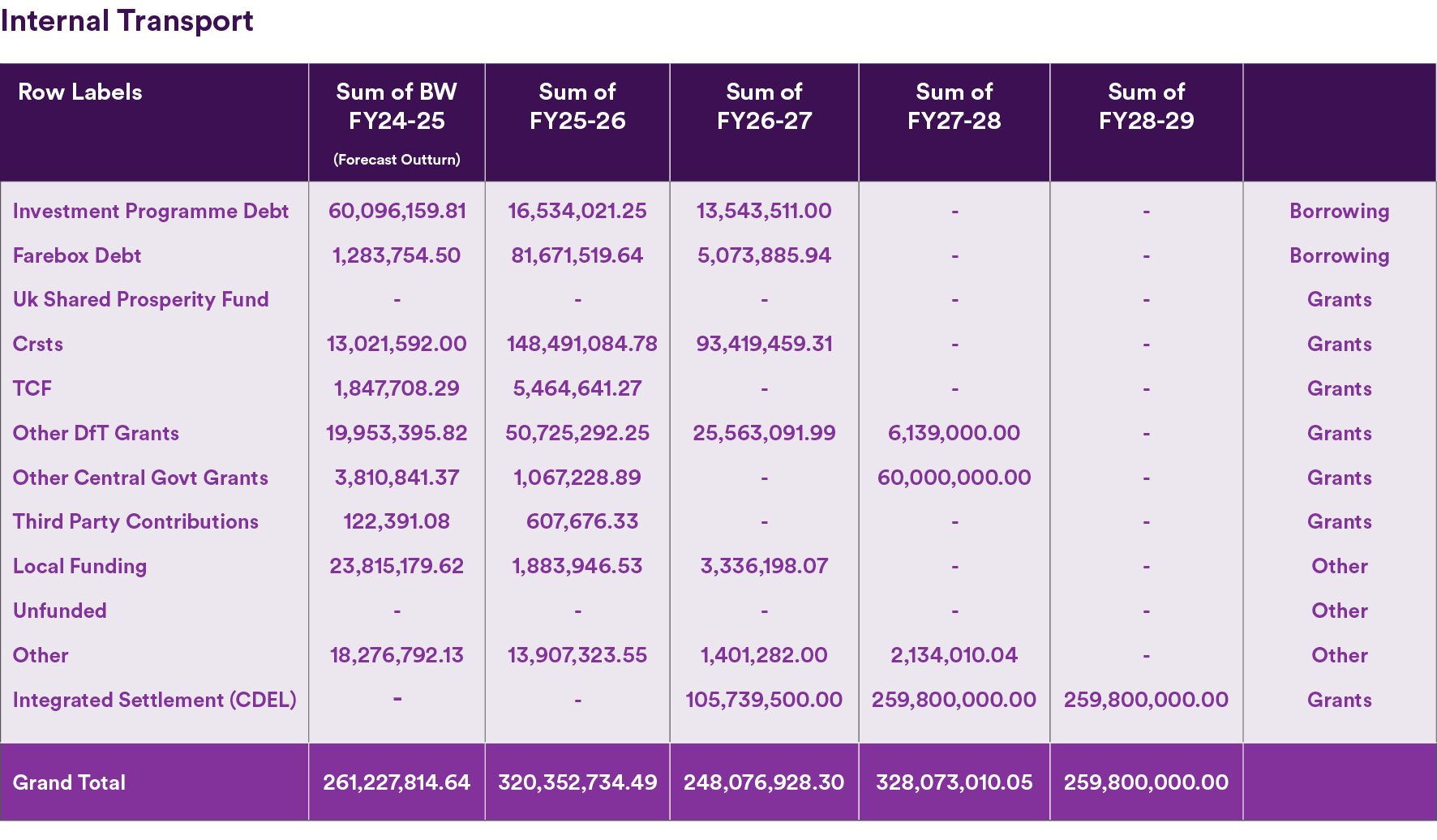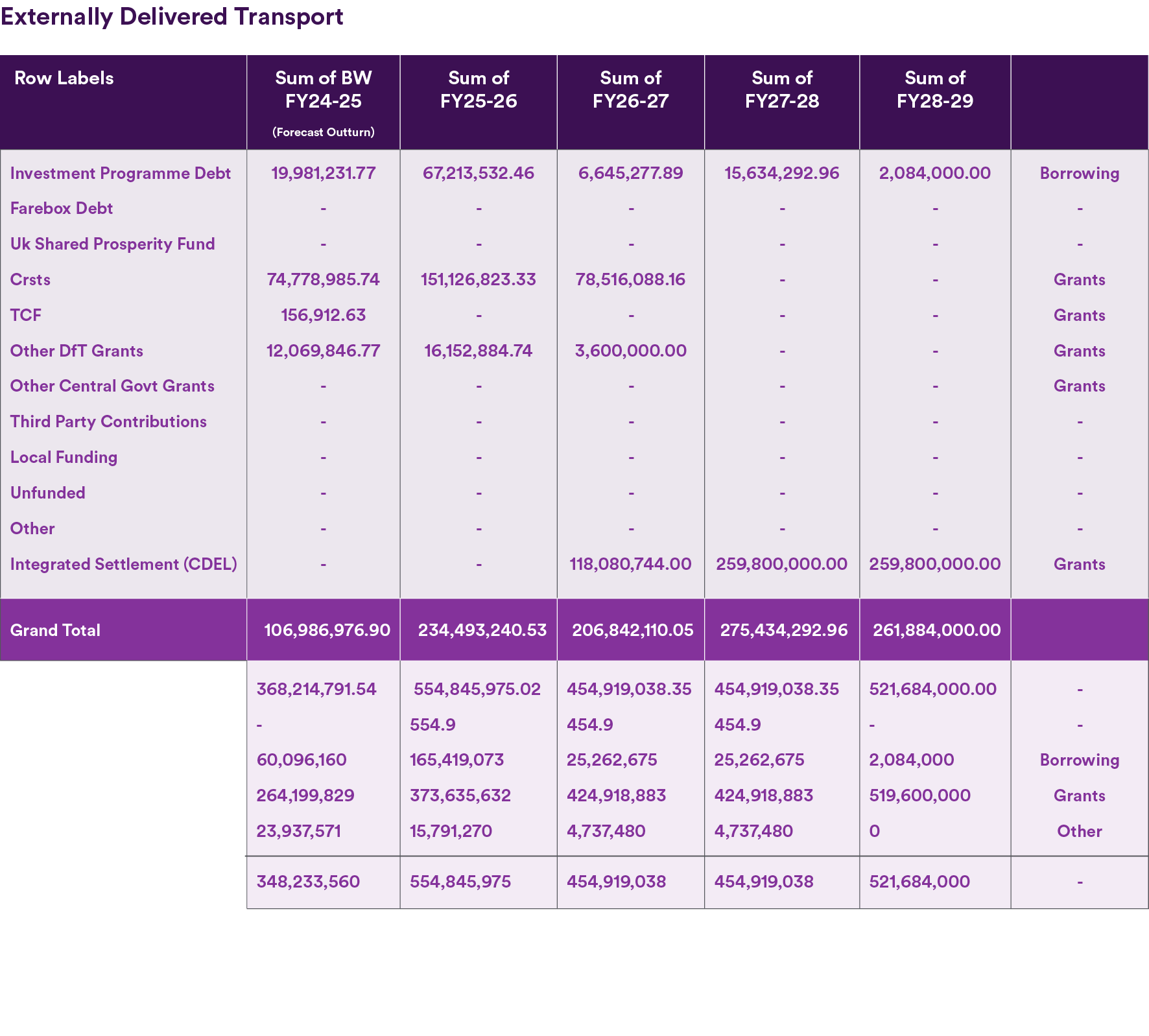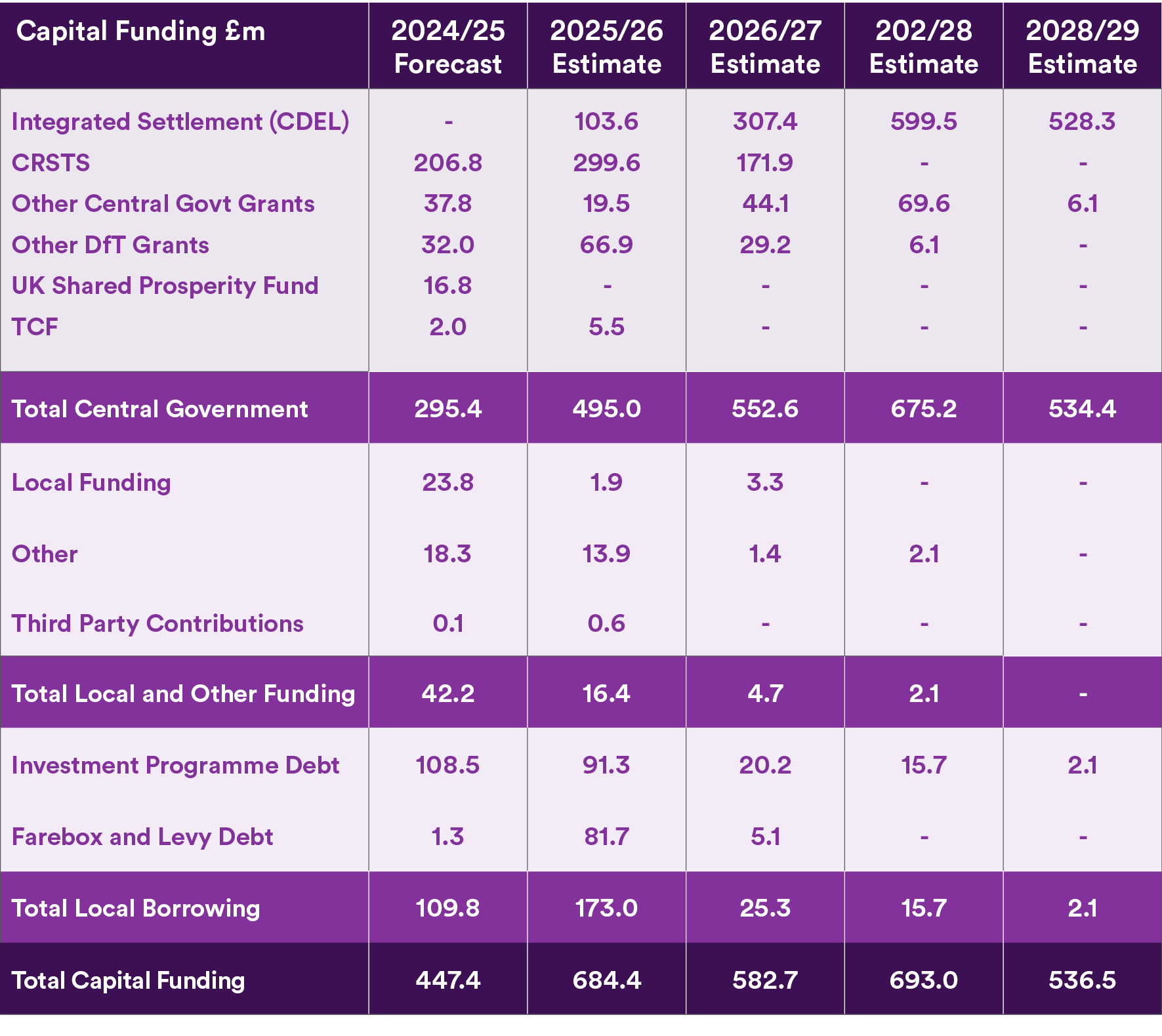Where does Transport for West Midlands spend its money?
Who we are and what we do
We are Transport for West Midlands (TfWM), part of the West Midlands Combined Authority (WMCA). We strive for a vibrant region fuelled by transport choices that are not just inclusive and fair, but appealing. We're here to offer options that people want to use, all while positively shaping our community, improving the local environment, and boosting the health and happiness of our residents.
Our purpose is to ensure there are journeys for everyone so as a combined authority, we can create a better connected, more prosperous, fairer, greener and healthier region.
Transport is crucial to regional connectivity, our ambitions on inclusive growth and in turn, to national economic success. An affordable, safe, efficient and reliable transport network is what connects our communities; enabling them to travel to and from work and education sites.
A robust and connected network enables economic growth, encourages trade, regional development and attracts investment into towns, cities and regions.
Our team is proud of what we do. It's not just about helping our residents and visitors travel safely, reliably, and affordably – it's about creating journeys that people want to repeat and are accessible to everyone. We’re motivated to not just maintain, but enhance our local surroundings, and champion a transport system that leaves a lasting, sustainable legacy, touching every corner of our community.
As an organisation, we do many things to make our transport system function most effectively for the customer and deliver experiences that they want to repeat. As well as supporting, convening and influencing we:
 |
PlanWe work across the WMCA, with local authorities and their communities to develop and fund strategies and solutions that not only address current needs but pave the way for the future, ensuring that we consistently stay one step ahead. |
 |
BuildFrom metro extensions to priority bus routes to new rail stations to world-class ticketing solutions, we are building a transport network that delivers for the everyday needs of the West Midlands. |
 |
OperateAnd once we build it, we make sure that we continuously improve it to meet the changing demands of the traveling public and ensure their experience lives up to the expectations. |
Through all of this, we empower our team to be collaborative, driven, inclusive and innovative. Working with partners, we combine our expertise and energy, to work in the best interests of the transport user and residents of the West Midlands.
This document outlines to you, where we spend your money. The total operating budget of West Midlands Combined Authority is:
Capital Expenditure and Funding


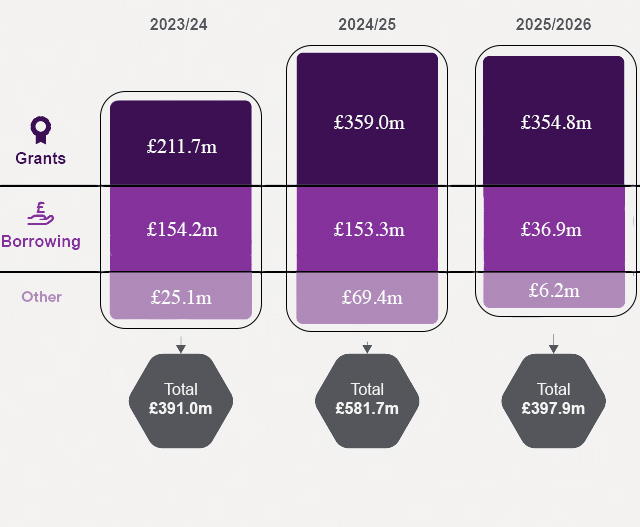
Supporting our Community
Each year all seven of the West Midlands Local Authorities contribute to the annual collective transport budget. This is called the Transport Levy. It is used to provide an array of transport services to communities across the region. The contribution from each Council is:

This funding covers the delivery of the following transport services and functions:
Last year's breakdown:

Funding public transport in the region helps residents access jobs, education, healthcare services like GPs, and leisure activities. However, TfWM also provides various support measures for young people, the elderly, and those out of work through our Supported Travel Policies. Our range of services includes offering reduced travel tickets, managing bus stops and stations, ensuring the safety and security of travellers through the Safer Travel Partnership, and staffing these services.
The English National Concessionary Travel Scheme
More than half the levy funds the English National Concessionary Travel Scheme (ENCTS) for older and disabled people (who qualify) for free bus travel. This is then enhanced with further local funding, from the levy to cover free train and tram travel.
Tendered Bus Network
We also subsidise our bus network, providing contracted services where commercial services run by bus operators are making a loss. Funding in the earlier years of the pandemic was paid directly to operators, compensating them for lost fares revenue. Yet as these contracted services have continued to come under pressure from inflationary factors including rising fuel and labour costs and slow recovery, the Government has provided further grant funding which has allowed the WMCA to support the commercial network locally. Approximately £110M of funding has been provided to the Authority to invest in the wider network from 2020 to 2025. This funding has also supported the introduction of simpler fares and a £2 fare cap throughout 2024, which has then risen up to £2.90 from January 1, 2025. When combined, these measures have helped maintain our bus network
Safer Travel Partnership
TfWM has a vital role to play in maintaining a safe and secure transport network. We are a part of the Safer Travel partnership which works with British Transport Police and West Midlands Police to keep the travelling public safe. We have a dedicated team of Police Officers and fourteen new Transport Safety Officers who patrol the bus, train and tram network.
Supported Travel Policies
Through the Supported Travel Policies, funded through the levy, TfWM has provided additional support beyond that of the national statutory minimum. This support includes:
 |
Child concessions• Delivers 12.6 million journeys per annum for young people and children during peak travel times (equating to 5% of all bus boardings) • Enables over 65,000 young people to access school • Enables over 6,000 young people aged 16 – 18 to access training and apprenticeships |
 |
Rail and Metro concessions• Delivers over 2 million journeys per annum (equating to 3% of all Rail and Metro journeys made in the region) • Enables over 120,000 existing users to use tram and rail services regularly |
 |
Accessible transport including Ring and Ride and West Midlands on Demand services • Supports 228,500 accessible journeys for those unable to use conventional public transport |
 |
Tendered Bus Network subsidised bus routes, which aren’t commercially viable for our operators to run • Keeps over 2.6 million of the population within our bus stop standards • Enables over 10.2 million journeys to be made on the tendered bus network per annum, which could be to more isolated areas or outside of peak travel times. |
 |
Night time support - ENCTS Post 11.00pm Add-on • Delivers over 140,000 journeys • Is used by over 15,000 existing pass holders • Supports the night-time economy and local centres across the region |

Source: TfWM
In addition to the core Supported Travel Policies additional funding has been sourced for TfWM to provide:

Growing the Transport Network
The West Midlands has an extensive and ever-growing transport network. TfWM is continuing to invest and support that growth. In 2024 the following journeys have been undertaken:

The trends from 2024 remain with a continuing return to pre-Covid patronage levels, with some continuing post-Covid patterns - a reduction in the volume of trips on Mondays and Fridays for commuting compared to pre-Covid, and a growth in rail growth in leisure trips.
Bus recovery is particularly noted in the context of a, despite the challenges that operators have faced in providing a commercially sustainable network.
The Passenger Incentive Programme (PIP, funded by BSIP) is incentivising modal shift via organisational partnerships whilst also supporting groups and individuals that will benefit most from travel support, with over 3.5 million individual bus journeys made since its inception.
Workwise
The Workwise programme provides free travel, for up to 3 months for those newly securing work opportunities to ensure they can attend interviews and bridge the pay day gap between starting work and their first pay packet.

Investing in the transport network
The network itself is continuing to grow, TfWM receives extra funding to support and grow the transport network. There are a number of funding agreements from central government that are spent in the region.
Across the different transport modes, the following investments are being made:
Active Travel and micro-mobility
Ensuring the West Midlands is a prosperous and happy society is linked to levels of active travel. It benefits people's health, their state of mind and generates environmental and economic benefits. TfWM will work with Local Authorities and Active Travel England to spend £21,182,890 in 2025/26 on Active Travel measure supporting people to walk and cycle more often in a safe and secure environment.
Expanding the regional e-scooter hire scheme, building on the existing West Midlands Cycle Hire offering, and ensuring a consistent approach to micromobility within the region.

Bus and Sprint Bus
In 2025/26 funding from the City Region Sustain Transport Settlement (CRSTS) funding pot of £1.05bn, awarded from 2022 to 2027, will enable the delivery of schemes such as Dudley Bus Station, linked to the wider Interchange and Metro line, the continuation of works on Sprint bus routes on the A45 in Solihull and Birmingham as well as the cross-city bus route improvement programme – providing more reliable journeys on city-wide bus services.
Rail
there are five new railway stations under construction across the West Midlands, 3 in Birmingham at Moseley, Kings Heath and Pineapple Road, all of which are scheduled to open in 2025. Work also continues at pace on two new stations in Willenhall and Darlaston. These schemes have been made possible thanks to CRSTS funding as well as the WMCA's Investment Fund.
Metro and Very Light Rail
In 2025/26, WMCA will continue to support key Metro project delivery, with the Black Country metro extension a flagship project for the region. Work also continues on the Birmingham Eastside Extension in Birmingham City Centre, linking the Metro network with the proposed HS2 Station at Curzon Street. In addition to this, essential maintenance of the existing tram system will also be undertaken, helping to deliver a reliable and safe network to passengers.
At the same time, the work of transport innovation continues to move at pace, the region is at the heart of trialling Very Light Rail research in Coventry, this is testing a new kind of vehicle and track that could bring down the costs of developing a tram-like transport network in the future.
Highways
The roads of the region are vital. The CRSTS funds ongoing highways maintenance work in 2025/26 across Solihull, Coventry, Dudley, Sandwell, Walsall and Wolverhampton.
Electrifying the network
TfWM recognises the need to move to cleaner fuels in use in the transport network as part of a wider air quality strategy, this is because road transport in the West Midlands is the direct source of 82% of Nitrogen Dioxide emissions and 19% of fine particles (PM 2.5) emissions, the UK’s two main air pollutants. There has been a combined investment of around £180 million from TfWM, National Express, Stagecoach and central Government to run 204 electric buses in Coventry.
In addition to the public transport network, TfWM is supporting private vehicles through the development and delivery of public infrastructure for Zero Emission Vehicles, with £40 million secured from Government funding to enable our communities and business to transition away from combustion engines for cars and vans.
